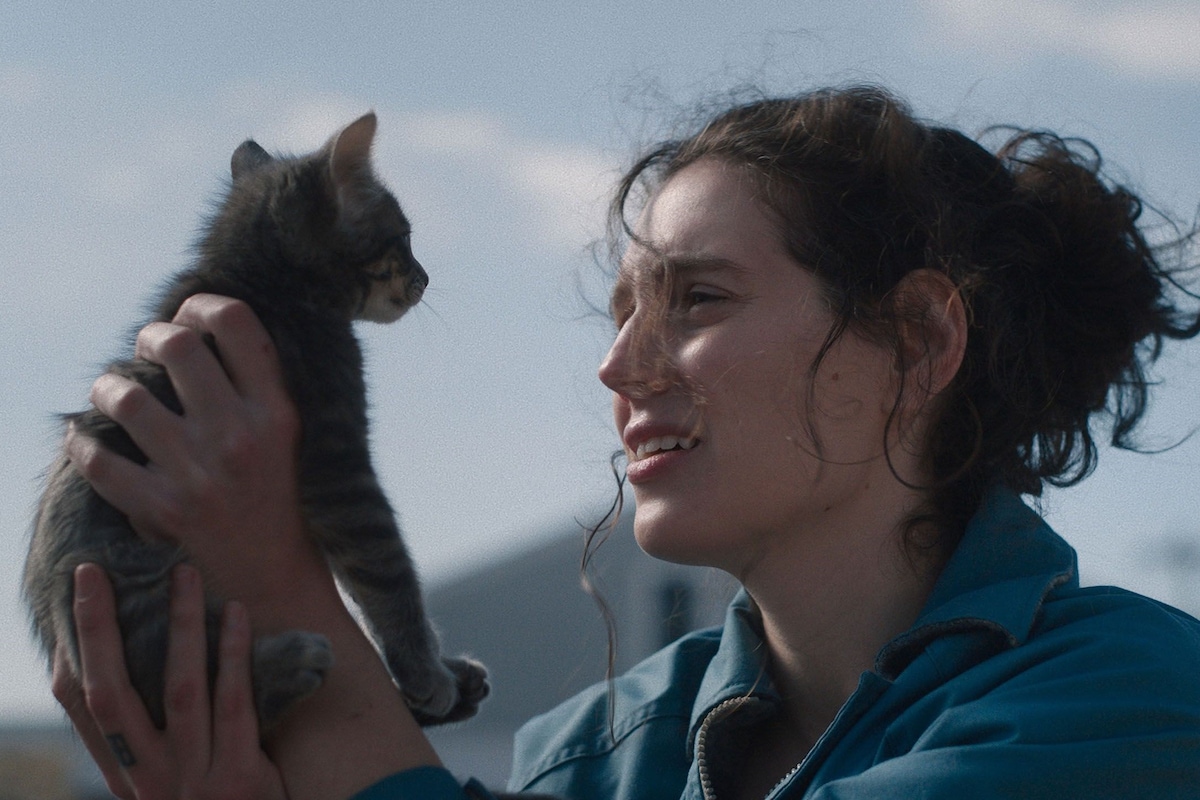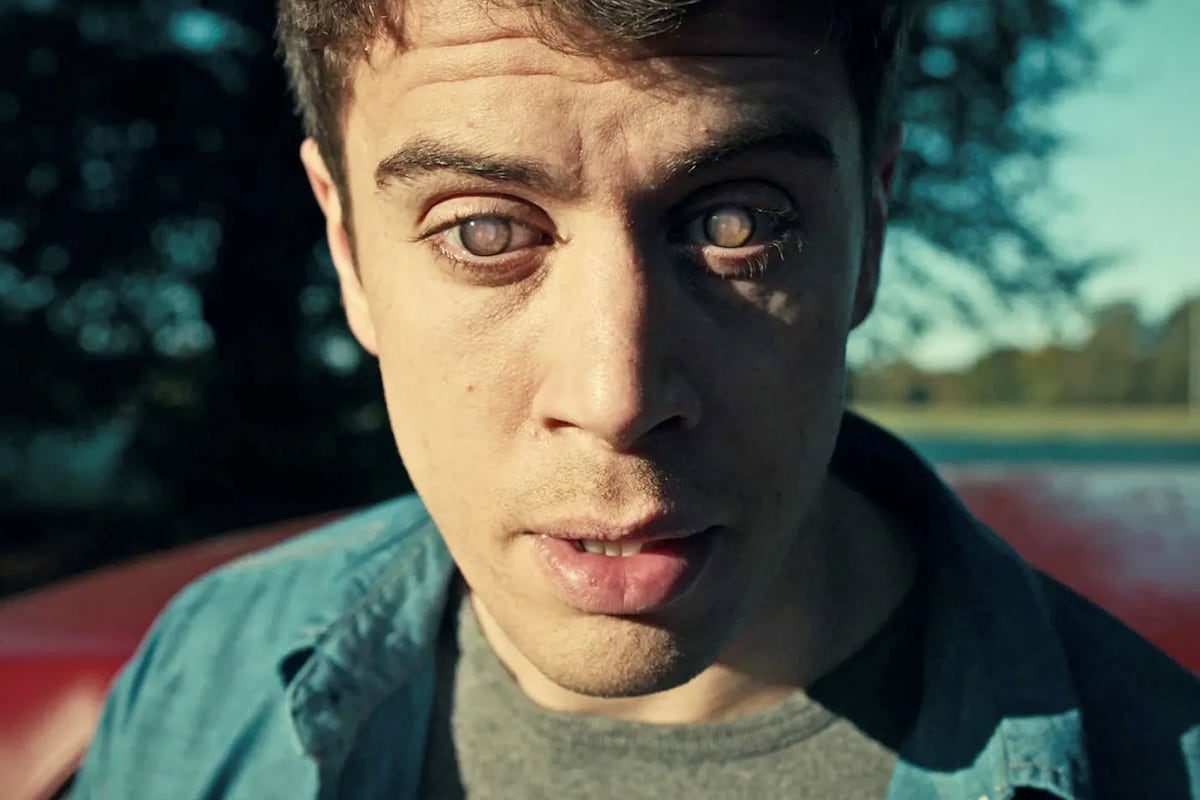In life, a lot of films will float through you. But there are a select few films that stick, wrapping their cinematic tendrils around your heart and lodging themselves in the folds of your memory. Sorry, Baby is one of these films: heartwarming and heartbreaking, this impressive directorial debut from writer, director and star Eva Victor follows Agnes, a young New England literature professor contending with PTSD in the years following a sexual assault. Agnes’ life is captured in non-chronological snippets as they try to break out of the stagnancy they find themselves in; by their side is best friend Lydie (Naomi Ackie) and sweet next-door neighbour Gavin (Lucas Hedges), both of whom lend an ear to Agnes as they heal.
Victor’s bittersweet, powerful writing and directorial confidence make her seem like a filmmaker far beyond their debut. Ahead of the film’s release, we chatted to the cinematic triple threat (writer, director and star) about the personal nature of filmmaking, the ups and downs of a press tour and listening to what the film says it needs.
How has it been for you to not only make this film, but then embark on a press tour and be asked to discuss trauma and PTSD?
Eva Victor: It’s been really hard. I can’t totally relax because I never know what’s gonna come. There’s a desire to protect myself in a lot of ways. I do think it’s intense to go through this, but I think most of the questions are coming from really kind places.
It’s funny because you make a film to hold all your feelings and thoughts about something, and you’ve tried to say it in the simplest, most eloquent way. An hour and 40 minutes is how long it takes me to tell you how I feel about all of this. So it’s funny my clunky language has to surround the thing that is saying the thing I want to say.
You shadowed Jane Schoenbrun during the filming of I Saw the TV Glow. Was there anything you learn from Schoenbrun that you deliberately applied to your film?
Eva Victor: I learned so, so much from shadowing that film. I learned about myself as an artist, a moviegoer, but mostly about myself as a person. I got so close with Jane and Sepi [Mashiahof], Jane’s assistant on the film. I felt so seen and so loved. I hadn’t spent that much time in that kind of queer community before, and it meant everything to me and changed my life. Getting to watch someone who has so much vision, tenacity, energy and love for the film they’re making is astounding.
I never thought about how I watched a horror movie get built and then shot things in a horror way. That’s very cool. Something that Jane is really brilliant at, and that’s encouraged me, is to consider the visual story. I come from a world that’s more comfortable with the words people are saying. Jane builds a visual vocabulary that’s beautiful and cohesive. I hope some of that made it into my life, but it’s a goal I have to become more trusting of visual vocabulary like them.
There was something that happened in the edit that was so spiritual: you feed the film enough that it begins speaking to you about what it wants and what it needs
Another director you’ve connected with is Celine Song. On the A24 Podcast, you both spoke about making a film like a body being chopped up and rearranged. It made me think of Sorry, Baby being about Agnes’ body and rearranging herself. Does that resonate with you?
Eva Victor: Yes, there was something that happened in the edit that was so spiritual: you feed the film enough that it begins speaking to you about what it wants and what it needs. I think the pain of making a film is trying to figure out how to make it breathe, then once it starts breathing, it’s such a miracle that you need to listen to it.
I also think there’s this thing that happens with trauma. The world tells us about rules that exist and we believe them, like ‘this is your body, you get to decide where it goes and what it does’. Or ‘there are boys and there are girls’. Those are the rules. When someone breaks a rule, like when someone decides that your body is actually something they can control, that makes the whole façade of rules crumble. Agnes is experiencing the body being divorced from the spirit, and in the wake of that, trying to rebuild the connection to the body and what is real. How does my spirit live in this body now that the body is being rediscovered for the first time?
I’m interested in how writers name their characters. Gavin mentions Agnes is the Latin for ‘Lamb of God,’ but how did you settle on the name?
Eva Victor: It was a gut [instinct] thing. There wasn’t something I was naming her after, but it is that special thing that feels like a reward for writing: once you find a character’s name, that person is now whole. I felt like that with Agnes and the name of this film, I didn’t have it until I was done writing.
I wrote ‘Lamb of God’ because I must have looked it up then Lucas asked me: ‘I looked it up and it doesn’t say Lamb of God anywhere, I don’t know where Gavin got this idea’. I liked that Gavin understands the roots of words and I think names are super important. Lydie, too, felt like a nice counterbalance. Agnes feels heavier, like a blue rectangle, and Lydie feels like a round, yellow orb.

That’s interesting. Lydie sounds like a blue circle to me.
Eva Victor: That’s perfect, because there’s more than one shape and colour for a name. I love that!
Throughout Sorry, Baby we see Agnes come to terms with feeling stagnant and work to move forward. Have you had that experience of feeling stuck, whether it be making this film or throughout your career, and what got you through it?
Eva Victor: I’ve definitely felt stuck. At one point, I started to get these creeping realisations that no one was going to come save me. I had been auditioning for years and I was like ‘oh my god, I might not be one of the people who gets whisked off their feet’, but maybe that’s OK and I’m the person who whisks myself off my feet. I had to get to a pretty delusional place of being like, ‘I’m awesome’. There’s something really cool about that, and there’s something heartbreaking about that, too.
You keep putting yourself out there for other people to choose or not choose. But you can say ‘fuck you’ to that. Actually, I have the tools to build the thing that I dream of someone building for me and I’m the most equipped to give myself nuance, the nuance I’m craving and the kind of work I’m craving. That ability to not put myself in a box that other people were interested in putting me in has been very, very useful. I think that might just be how it works to be an artist: you have to pick yourself up and write something that you want to see.
Sorry, Baby is out in UK cinemas on August 22.



